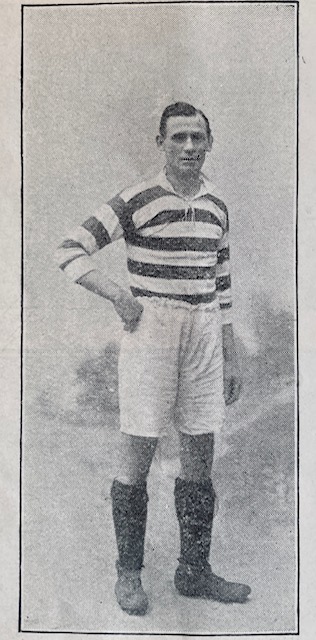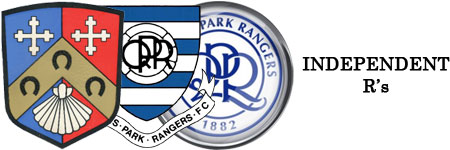League Division 3
Team: Hill, Blackman, Grimsdell, Grant, Mitchell, O’Brien, Faulkner, Birch, Smith, Gregory, Middlemiss
After a goalless draw at Reading the previous week, it was Luton Town who travelled to Loftus Road on 25th September 1920. A match report, from a Luton perspective, appeared in the Beds & Herts Pictorial three days later:
‘It was the first time I had seen the Town this season, and when I say that, I came away very, very, very disappointed. I am putting it quite mildly.
I had been led to think from the reports in the “News” and “Telegraph” that the Town side were very strong in staying power and would fight to the last minute.
They did nothing of the kind, and as the game progressed I longed for a return of the strong, cool play of Bob and Fred Hawkes, for the middle line was the chief weakness of the Luton side, and the wing-halves were not worthy successors of the two Hawkes.
The Rangers started as if the result was a foregone conclusion, but when the minutes past and the opening goal did not come as easily as they expected, they began to look anxious.
The Luton forwards were always dangerous when they got a move on, and very early on in the game Grant was made to realise that he could not hope to overtake Bookman if the latter once got away.
Grant is by no means a slow coach, but the little man got in about four strides to two, and Blackman often looked at his colleagues when Bookman was speeding along the wing.
The Luton halves, however, were rather slow, and Tirrell was rather shaky in facing Faulkner and Birch. As a matter of fact, it was faulty defensive work on the visiting left-flank that brought the first goal.
Luton had been playing curiously, one moment displaying any amount of grit and speed, and the next playing rather listlessly.
Cockerill was beaten by Faulkner and Birch, and then Tirrell failed to get the ball away cleanly. Faulkner got it and gave Birch a chance that was promptly accepted, Bailey having no chance.
Simms had several raids on the home goal, but Hill was not severely taxed, and at the interval the Rangers led by a goal to nil.
There were around 25,000 spectators to urge on the Rangers on the resumption, but somehow Luton appeared to be dispirited, and before they had got on the move at all effectively there was a melee in front of Bailey, and Birch popped the ball into the net.

Someone in the crowd shouted “Bonus” and whether his voice carried above the frantic applause which greeted the goal or not, I cannot tell, but it seemed to me that it must have been heard by everyone of the Luton players, for they suddenly set up a pace that left the home players standing, and the little evidence of ill-temper that we had seen in the first-half began to increase.
Mitchell, in particular, appeared to resent being beaten, and there were one or two nasty ebullitions of temper.
The play became faster and was forced into the home half, and Hill scored the best-earned goal seen on the Rangers’ ground this season. Hoar dashed through and put the ball beautifully into goal, Simms’ shot was pushed out by Hill, but Percy Hill had followed up and smartly rapped it through.
The hitherto listless side played like men inspired, and again and again it was touch-and-go for the equaliser.
Everybody thought it had come when the best shot of the game was made by Parker, for he took a fine kick from close to the penalty area and sent the ball at terrific speed straight at goal, but it scraped the bar, with Hill hopelessly beaten.
Then Mitchell appeared to revive, and he set his forwards going, and Luton’s defence was given a hot time. Bailey did magnificent work, but he was helpless to prevent Gregory heading through Faulkner’s centre.
The visitors now seemed to give up the ghost, and ten minutes before the end Cockerill fouled Smith in the penalty area, and Mitchell beat Bailey with the shot.
Now to claim that the Rangers were rewarded to a greater degree than they deserved. They were quite good value for four goals if Luton were value for one.
There were times when the Luton forwards did good work, but they were always playing against odds, and while the Rangers’ middle line had not a lot to boast about, they were much better as a line than the visiting middle men.
Mitchell is too prone to illegal tricks, and few referees seem capable of catching him as often as he should be caught and penalised. Why, it is impossible to say, but it seems to me that the Rangers’ captain’s personality is so masterful that he does pretty much as he likes.
In the Luton inside-forwards he found doughty opponents who feared nought in that respect, anyway.
The home team, however, showed much better understanding than Luton. There was plenty of fast-forward play, and the defence was steady at all times, and the Rangers’ inside men gave their wingers any amount of work.
Indeed, I should place this excellent nursing of the wingers as the first reason for the victory. Smith, Birch and Gregory did very little short passing, but they sent the ball out-wide to the wingers, who were speedy and tricky, and in return dropped the ball time after time in front of goal.
Faulkner was about the best of the home vanguard, and from him came most mischief, but Smith and Birch made good use of him.
There was little to choose at half, Grant probably being a shade the best, but there was nothing to choose between Blackman and Grimsdell, who are really fine defenders. Hill kept goal splendidly but had not a gruelling time.
For Luton, Bailey was positively brilliant, and the praise of him I read in last week’s papers might well be repeated.
The backs worked very hard, and Lennon was the cleverest defender on the field. He foiled Gregory and Middlemiss time and often when Molyneaux was beaten.
Tirrell was not sharp enough for Faulkner, but there seemed to be a lack of understanding between him and Cockerill. Cockerill was often playing more attention to Birch, than to the extreme winger, who is a dangerous man to leave unattended.
Molyneaux was a worker, but not brilliant, and Parker was easily the best of the line. He played hard throughout and in many duels with Smith he came out with honours.
Simms played hard throughout, but I thought he was apt to hold on too long against such hefty men as Blackman and Grimsdell, to say nothing of the vigorous Mitchell.
I fancy the Rangers will not lose too many points on this ground. It is too small, and players who are accustomed to plenty of room are either swinging the ball into touch or hampering each other’s movements.
If ever there was a need for the FA setting down a rule for a definite measurement, it is found in the case of the Rangers’ ground, but it would be a bad thing for the Rangers’ Club, for they cannot extend it.
As a Lutonian, I hope to be able to come down and see the Town win on Saturday, but I am afraid one or two changes will be necessary if that is to happen.’
This win left Rangers in sixth spot, just two points behind the leaders, Crystal Palace.
Steve Russell
(Thanks to Colin Woodley for unearthing the match report. Shown above is the legendary Jimmy Birch)
